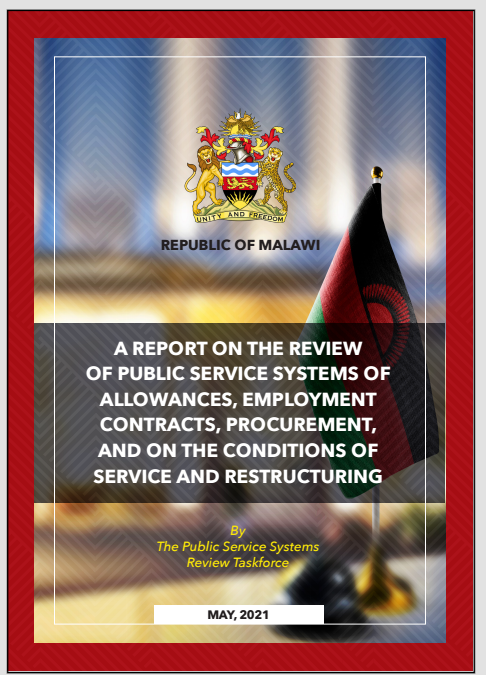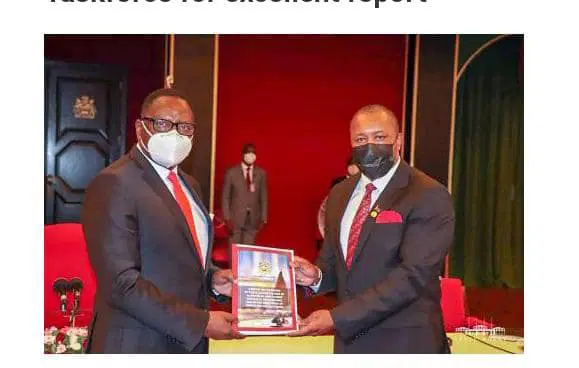…He has only implemented two issues since report was issued

Embarrassing! President Lazarus Chakwera received a report on the review of Public Service systems of allowances, employment contracts, procurement and on the conditions of service and restructuring by the Public Service Systems Review Taskforce in May 2021 and decided, on the 11th Hour, not to release its contents to the public as he earlier promised.
The most embarrassing thing is that in the three years that the report has been gathering dust in a file cabinet at State House, the President has just fulfilled only TWO items of the many proposals that the review taskforce, headed by Vice President Saulos Chilima, proposed for the good of the country, namely transport allowances and meal allowances for civil servants.
We have managed to quickly breakdown some of the proposals in the report that the President was asked to implement and you are the best judges on who wishes this country good and who is taking this country to ‘Bagamoyo’……
Allowances for Members of Parliament
The Taskforce on the review of Malawi’s Public Service Systems recommended that;
1. The Parliamentary Service Commission should remove the double payment of sitting allowances for Members of Parliament and parliament staff since this is
double payment as they are already paid a salary and other allowances.
2. That paying sitting allowances in order for them to fulfill these responsibilities amounts to double payment, because they receive a salary.
3. Furthermore, these allowances are paid in advance and not recovered when MPs are absent.
4. Parliamentary staff also receive sitting allowances when serving parliamentary committees, although this is not provided in their conditions of service.
5. The Taskforce estimated that, on average, a Member of Parliament (MP) gets more than MK2,750,000 per month in remunerative allowances, and over MK4,400,000 for the Speaker, not including salaries.
6. For example, the minimum local subsistence rate for an MP is MK60,000, which equals to the maximum rate for a civil servant.
The Taskforce also noted that the maximum rate for external travel allowance for MPs is more than double the maximum for the civil service ($650 v $300).
Reforms Report on Subsistence Allowances
The Taskforce on the review of Malawi’s Public Service Systems observed that
subsistence allowances for travel are the most prone to abuse.
For instance, in the 2019/20 financial year, MK27.4 billion was approved for subsistence allowances, but what was actually spent was MK 33.7 billion. Over 88% of these allowances are spent by central government officers.
Therefore, the Taskforce recommended that;
1. Government implement full-board facility for local travel, with effect from 1st July 2021 for grades E and above, and transition all other ranks to fullboard according to grade with effect from 1st April 2022. This will eliminate or at least reduce chasing of allowances for personal gain, while making sure that public officers on duty are properly accommodated.
2. The Department of Human Resource Management and Development should negotiate with hotels, motels, and lodges special government rates for full board for public officers including ministers, with maximum rates for lunch and dinner as part of the full-board regime, excluding laundry and alcohol.
3. Introduce IFMIS-generated Local Purchase Orders (LPO) for hotel/motel/ lodge accommodation bookings, and engage service providers so that payment is made after being invoiced.
4 Controlling Officers must ensure that all full board invoices from hotels/ motels/lodges are paid within 30 days and they will be held accountable for failure to settle bills, with sanctions following.
5. Review the Incidental Allowance Rates attached to full board regime and adjust them accordingly
Reforms Report on Employment and Contracts

The Taskforce on the review of Malawi’s Public Service Systems observed that despite having clear procedures and authority in the administration and management of employment contracts in the public sector, there is poor enforcement of existing laws and regulations.
It therefore recommended the following;
1. Presidential appointees on employment contracts for a specified period,
such as personal assistants and diplomats who are not career civil servants,
and non-statutory political appointees such as Special Presidential Advisers,
should not transition into the mainstream civil service.
2. Furthermore, the length of employment contract should be aligned to the terms of office of their principles, be it the President, Vice President, Ministers, and Deputy Ministers, as the case may be.
2. With immediate effect, appointments in parastatal organisations should be
done by the appropriate authority, as provided for in the specific parastatal’s unless the Act specifically provides that the appointment or recruitment ofany of its staff will be made by the President.
3. All appointments and recruitment must adhere to the existing laws.
Reforms Report on Salaries: No Civil Servant Salary to be Below Cost of Living
The Taskforce on the review of Malawi’s Public Service Systems observed that salaries are lowest in the civil service and highest in parastatals, including state-owned enterprises.
The Taskforce therefore recommended that;
1. Government must improve the salaries of public servants so that the lowest paid employee should receive a salary which responds to the Basic Needs Requirement.
2. At any point in time the salary of the lowest paid public servants should not be lower than the cost of living.
3. Introduce a contribution towards housing and transportation through appropriate non-taxable allowances as recommended below.
4. The Public Service Commission recommended that the cost of living be monitored and reviewed at least on a quarterly basis to be used in reviewing salaries.
5. Paying public officers salaries that are below the minimum needs basket violates their right to fair remuneration as is provided under section 31 (1) of the Constitution.
6. There are huge disparities in salaries in the public service paid for work of equal value especially between the civil service and the parastatals. There are also huge disparities among the parastatals.
7. The disparities violate the principle of equal remuneration for work of equal value as is provided under section 6 (1) of the Employment Act (2000) and section 8 of the Public Service Act (1994).
8. Most civil servants, especially in the low cadres, lack decent housing accommodation and face transportation challenges to and from work.
Reforms on Political Influence on Recruitment Process
The Taskforce learnt that the reported forms of maladministration usually come about because of political influence and interference, cronyism, favouritism or/and corruption.
” It appears there are people determined to put candidates in certain positions, regardless of stipulations of the law,” reads the report in part.
It therefore recommended that;
1. The respective boards and DHRMD should terminate all irregular contracts including those people recruited without following government-approved procedures, without appropriate qualifications, political appointees who were mainstreamed, and those who are past the mandatory retirement age, by end June 2021.
2. Recruitment procedures must be followed to the letter, and where they are flouted, the responsible officers, including boards, must be held to account.
3. Government and parastatal boards must carry out Human Resource Audits, or take action on existing Audit reports, to confirm unprocedural recruitment. Contracts for all those irregularly and illegally employed must be terminated.
4. OPC, DHRMD and MDA’s should immediately discontinue the practice commonly known as “Quarantine,” “Guantanamo Bay” or “Warehousing”, where officers are deployed without being assigned to appropriate functions, but get free remuneration.
5. Controlling Officer should follow appropriate procedures for addressing indiscipline and under-performance, including termination of services, as provided for in the Employment Act.
6. DHRMD should provide guidelines for redeployment and redundancy scheme. All affected officers must have their cases resolved within three months.
Reforms Report on Performance Appraisal
The Tasforce observed that the Malawi Public Service’s performance and productivity is low, and cannot support the achievement of Malawi’s ambitious development goals and Malawi 2063 vision.
It recommended that;
1. To demonstrate strong leadership from the top and the value that the government places on performance appraisals, the State President should introduce performance appraisals of the SPC, supported by independent external evaluators to ensure that all key responsibilities outlined in the PSA, PFMA, and other laws are addressed in the appraisal, with the first round to be completed by 1st June 2022.
2. SPC should implement annual performance appraisals for Controlling Officers in line with Performance Contracts of MDAs and in particular, adherence to set regulations and procedures governing allowances, other financial management issues, action on audit findings and ability to take disciplinary action on officers where acts of conduct have been committed.
3. The SPC should submit a report of all performance appraisal reports of all Controlling Officers to the State President by 1st June 2022.
4. Furthermore, the SPC should implement mechanisms for rewarding high achievers and sanctions for poor performers as stipulated in the MPSR, with effect from 1 July 2021.
5. The State President should introduce and lead a system for annual public participation in the appraisal of Ministers. Public participation in the hearings should be done through radio, television and other digital platform
Reforms Report on Moral Values
The Taskforce observed that moral decay has created a society that approves and celebrates illegal accumulation of wealth.
It recommended the following;
1. The President should embark on the process of identifying national champions and develop a programme to restore the moral and ethical values of the public service and society at large, which should commence on 1 October, 2022.
2. Secretary for Civic Education and National Unity should introduce a national week of advocacy for patriotism, integrity and high standard of moral values with immediate effect.
3. The Secretary for Education should facilitate the introduction of moral values, ethics, integrity, and discipline as an examinable subject in all public schools by 1st April 2022, working in consultation with religious institutions, such as the Public Affairs Committee, Evangelical Association of Malawi, Episcopal Conference, Moslem Association of Malawi, Malawi Council of Churches.
4. The SPC and Controlling Officers should ensure that all public officers attend the mandatory Code of Conduct and Ethics training and ensure that every officer appends their signature to show that they understand the contents. Subsequently, any officer who violates the code should be held liable with immediate effect.
School Fees for Children of Members of Executive Management in Parastatals
The Taskforce observed that currently, all parastatals pay 100% of the school fees for up to two (2) children (who are below the age of eighteen (18)) of members of executive management at international private schools of the Executive’s choice within Malawi.
Similarly, Parliament pays schools fees for the Clerk of Parliament, for up to three (3) children below the age of twenty-two (22) within Malawi. In all these cases, the choice of school is left to the discretion of the individual employee.
The Taskforce also established that diplomatic staff in the Malawi Foreign Service receive school fees allowance for up to four (4) children. However, the amount is capped to a maximum applicable at the employee’s duty station and to his or her grade.
It therefore recommended that;
a. Abolish the school fees benefit in public institutions to achieve parity in the public service and revise employment contracts accordingly
b. Current contracts to run their course before adopting this change in policy, and any new contract from the date of approval shall be on the new fixed contract template.
c. Only public servants in the diplomatic service should be provided with school fees support for children below the age of 18 years while in service at a diplomatic mission abroad, and upon return to their home service, for a period of three to five years to allow for proper adjustment and reintegration into the school curriculum.

